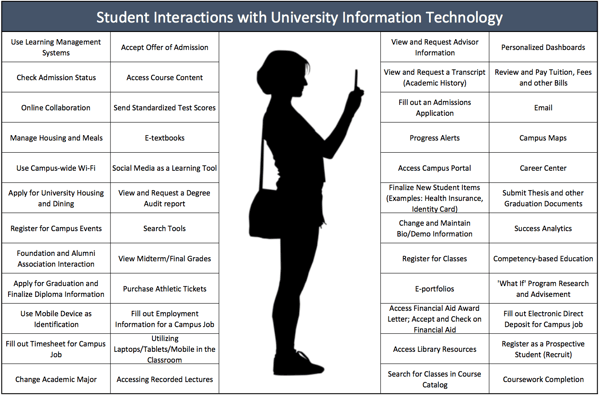Published on
Improving the Student Experience with Personalization and Integration

I was watching a student presentation the other day, and they pointed out how difficult it was to schedule a study room. While many colleges and libraries have study rooms that can be reserved online, they are not necessarily reserved using the same tool, and you need to be a member of a specific community to use some of the rooms. There isn’t an Airbnb for empty conference rooms or other shared spaces. More often than not, spaces are managed by individual colleges, and resources do not share easily across departmental boundaries. This adds unnecessary work on the student’s end.
Universities must do a better job of redesigning their business processes to be centered on the person that matters the most in a university: the student. The student is the customer and main driver of the economic engine of the university. By redefining the business process around the student, we can change the bureaucratic experience.
The diagram shows some of the interactions that a student has with the university. Time and time again, students want these interactions simplified. There are already some vendors that sell integration and aggregation platforms that simplify the processes. Nonetheless, it is rare that a student experience would include useful analytics about their current progress and their future job prospects in addition to easy ways to complete the numerous transactions. This is the goal, though.
Much of higher education is still based on a step model where you progress from grade school to high school to college, and then to better employment. While the education system treats the process as a step-by-step, that is not how people think or learn. In the wide world of education, students participate in online courses, continuing education modules, certificate training, short courses that result in badges, educational gaming, mentorship opportunities, and full degree programs. Furthermore, once you have one of these credentials, you need to prove to an employer that you achieved it. At the University of Illinois at Springfield, they are looking at blockchain to solve the credential puzzle. Rather than add a new line to your resume, your achievements can be added to a decentralized digital ledger. Education providers can make an entry when the student finishes an achievement, and that student can give permission to others to view it, which not only helps the student but also the HR office.
Personalization is prevalent outside of the university, and students are used to progress bars, tracking accomplishments, and self-motivation. After I buy Florida Georgia Line tickets for my daughter, I can guarantee that I’ll know about every country concert in the greater Chicagoland area. Every day, data are aggregated for students, and their mobile device tells them hundreds of bits of personal information. If we could combine this level of personalization with college registration data, grades, the degree audit system, and the career center, then I could give it to Watson. I’m certain that Watson would love to help students find the perfect job based on their personalized education path.
Would a student be willing to let personal information travel between departments and between internal and external education providers? Would they allow people to determine how their experiences ranging from extracurricular activities, scouting troop participation, high school education, college education, and work history could be translated into a better job or a higher salary? I’ve worked with many who say there is no way we could possibly violate a student’s privacy in this way. Meanwhile, that same student clicks away privacy on social media and playing mobile games. If you could click a button that said, “Share my data to improve my salary at a job I love”—would students do it? Yes, I think they would.
I’d like to see a dashboard for the student that provides not just the daily facts like assignments and due dates, but also personal and comparative progress bars that show how they are similar or different from their peers. We already have the data available to tell a student that 75 percent of the students that had their course load this semester graduated on time. We might be able to tell them the most likely employers for people with their current GPA. With mobile phones and beacons, we know who is studying where, and while it borders on creepy, it provides a way to find the right place to study any time of the day.
In higher education and in government, there is often a different group of administrators for each function. The same state government knows my driver’s license, registered vehicles, LLC information, professional registration, yet I must know either the physical location or the website for each of these so that I can do them separately. My son attends two colleges, so he has registration, financial aid, advising, ID card, payment, learning management systems and all sorts of other services duplicated. This unnecessary duplication drives students crazy.
Shouldn’t all of the available services be available to the student in one location? This does not mean to simply make a portal or a list of links. It means integrating the data so that it can be used together. There are already companies that use near field communication for payment in the cafeteria, and if Hilton can let you open the door with your mobile device, then why not residence halls? Theoretically, I should be able to register for class, transfer my financial aid to the bank, receive my football tickets, and open my door from the same device that I just used to ordered dinner and an Uber.
This is all in the realm of the possible, and states like Illinois are making it a priority. The Illinois’ “smart state” initiative is trying to simplify working with government on behalf of the citizen. Many universities have integrated gateways and new ID card systems that support some of these functions. However, as our students mention on what seems like a daily basis, some is not enough. We need a concerted effort to empower students to use their own data to personalize their higher education experience inside and outside of the classroom.


